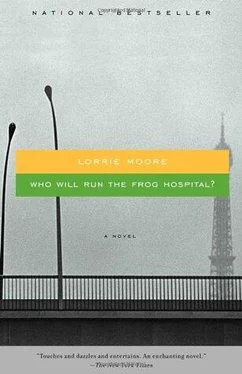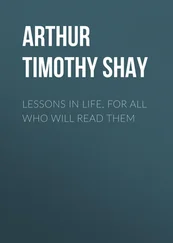“I’m going to have to make an appointment and just go,” she said.
I brought her orange juice and ice water and toast buttered so hard it had ripped the bread.
“I’ll go with you,” I said. “We’ll call Humphrey, and we’ll go.”
Which is what we did.
The following week Sils went to the local doctor, was given a pregnancy test and a referral. Then we phoned Humphrey, our cabbie, got him to meet us at the rear entrance of Horsehearts Park, near the pond where the heartless horses had reputedly been tossed, and we hopped into our cab to Vermont.
“Glad to see you girls again.” The drive was along the old Boston Post Road, and then up through farmland, mountains, past little orchards and churchyards with saintly white churches and graves. It was going to cost seventy-five dollars, round-trip, tip included. I remember thinking that once there had been a time when women died of brain fevers caught from the prick of their hat pins, and that still, after all this time, it was hard being a girl, lugging around these bodies that were never right — wounds that needed fixing, heads that needed hats, corrections, corrections.
“Glad to see you, too,” I said.
Now the countryside rolled by us, in a timeless way, and I felt like Robin Hood within it. Rob, pay, give away: however improvised, there was beauty to thievery; there were also rules. But I felt I understood them. I felt the pure priestly rush of their fulfillment swell and shrink and swell again within me.
We had the address of the clinic—217 Elm Street, Rutland — and we had six hundred and fifty dollars in fives and tens, a few twenties. Sils was wearing a shirt of mine — a green floral blouse with puffed shoulders and tiny buttons down the front. For some reason she’d wanted to. She’d stood in front of my closet and pulled it off the hanger. “Can I wear this to my abortion?” she’d asked, and, startled, I said, “Sure, if you want,” though the request frightened me and caused me to think too much about blood. I wondered whether I should have said yes at all. But now she sat beside me, wearing it, looking better in it than I ever could, her breasts pushing out at the fabric, whereas mine always shrank and shivered behind the hollow drape of it.
We passed through Hope, Argyle Hall, Mt. Bliss, and East Creek, the site of the East Creek Doll Hospital, where, when I was little, my mother would take my dolls to be repaired, an old Victorian house filled to the rafters with broken dolls — Barbies and baby dolls sitting bright-eyed all on top of one another in the parlor, on the stairs to upstairs, in the casements of the windows. The old woman who lived there collected dolls for their spare parts, eyes and limbs mostly, and if your doll had anything wrong with it, you could bring it to this woman, and she would fix it, keep it overnight. “We’ll just keep her overnight and give her some tea and some rest.” She was crotchety and doddering but with a magic wink that softened her face so that children could see she wasn’t scary; she wanted that known. Many of the grown-ups in town, the ones without daughters, didn’t know for sure. Her house seemed a witchy one, with spiders on the porch and a skyload of bats flying from her chimney at dusk.
Now that we were passing the house I wondered whether the woman was still there. Ten years had gone by — how old would she be now? I remembered years before seeing boxes out behind the house, boxes of just arms, or just legs, or just eyes, and I wondered what it would be like to see those boxes now, on this particular errand, from this particular cab. I twisted to see, as the taxi sped past, and could see heads and faces and little dresses in the front window. The house was still white with pink trim; there was still a porch swing, and a wishing well in the yard, but there was now also a gas station and a Qwik Stop next door.
“There’s the doll hospital,” sighed Sils, “with all its cheap irony.” Cheap Irony was the name of her brothers’ old band.
“Yeah,” I said. I twisted back toward her, to look at her, but she turned quickly away, leaned up against the armrest, and looked out at the hot road.
In those days in Horsehearts nothing, no building, had air-conditioning. After a summer rain, humidity soaked into the wood — the moldings, railings. Windows swelled at the sashes and joints. The steps and banisters went pulpy soft, the varnish gummy, the doors sticky and suddenly trapezoidal. The steamy heat fogged the glass, made every cracker in the house go stale. Earwigs roamed and measured the sinks. The hot tar roofs and rubber-lined gutters filled the air with a damp burnt smell.
But here, in this cab, there was air-conditioning. Things were sharp and clean — a luxury that took all sense of emergency out of what we were doing. It seemed we had won a little prize, and no matter our sadnesses we got to go on our cool, crisp trip. We said very little. Once in a while Humphrey turned on some music — we heard most of “A Horse with No Name”—but the reception wasn’t good through the mountains, and so mostly he’d turn the radio off again. Ordinarily, we might have sung in the silence, but I wasn’t going to unless Sils did first. I kept looking to see whether she would. “La-la-la-la-la-la,” she sang out once in a joky way, and then stopped.
“Loo-loo,” I sang. “Lee-lee.”
We passed charred old farmhouses, orchards, and cornfields. “We could all do a frog chorus,” I suggested loudly. A frog chorus was where each person said the name of a vegetable over and over, everybody doing it at once, at differing pitches, to create an amusing din. Potato, potato, potato. Carrot, carrot, I don’t carrot all .
Sils gave me a dismal, withering look, one that said, “Don’t be pathetic.” Then she turned back toward the window.
God, how life was full of moments that should have gone differently but didn’t.
“Rutland! We’re here!” called out Humphrey. “What’s the address again?”
“Elm Street,” said Sils quickly, looking a little pale. “Two-seventeen.” She had memorized it like a combination to a lock. When the cab pulled up in front, she got out quickly, swung her shepherd’s bag purse over her shoulder, and walked fast.
“Wait here,” I said to Humphrey, wondering how it felt to be bossed around by two girls.
“Whatever,” he said. I handed him thirty-five dollars, then I too got out fast and followed Sils, and my green shirt, to the sign that said Clinic Entrance.
Inside, after Sils signed in, and I handed the nurse all my money (except two twenties for the cab ride back, in the front pocket of my shorts) and the nurse counted it out on the reception desk in front of us, we sat in old brown leather chairs, waiting for Sils’s name to be called. I’d brought a deck of cards, and we played honeymoon bridge for at least twenty minutes, me winning, and then Sils winning, and then basically a tie.
“Silsby Anne Chaussée?” read a nurse off a clipboard, though there was no one else in the room.
“Bye,” I peeped.
“Bye,” Sils squeaked back.
I waited there for a while, reading pamphlets—“Contraception,” “Venereal Disease and You”—the heat of the room beading in the philtrum of my lip. Then I headed back outside to sit in the air-conditioned cab with Humphrey.
I climbed into the backseat and slammed the door. The air was icy and startling in a nice way. “Hi,” I said. What must he think of us, of what we were doing? He didn’t say. He simply stared out the front windshield and occasionally looked into the rearview mirror.
“Thought I’d wait in here,” I said.
“That’s fine.” He shifted in his seat a little.
“Do you want to play honeymoon bridge?” I asked.
Читать дальше












